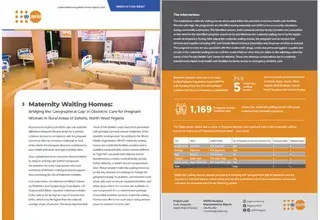Leading the sustainability efforts in Africa, Access Bank has called for more effective collaboration among stakeholders, as the bank recently hosted relevant international organisations and other stakeholders to its inaugural Annual Sustainability Summit on 29 & 30 April, 2019 at the Bank’s head office in Victoria Island, Lagos. Themed ‘Financing Sustainable Development’, the summit focused on providing a unique opportunity and safe place for sustainability practitioners to learn how to promote sustainable financing through offerings and services, sustainability communications and reporting.
Giving her welcome address, the Head of Sustainability, Access Bank, Omobolanle Victor- Laniyan, stressed that the country was at a critical threshold on sustainability-driven activities in Nigeria, with intensifying expectations on sustainability efforts and results from different sectors and institutions. “Although Access Bank is renowned for its commitment to sustainability, leading several initiatives that have contributed to the global discourse including the development of the Global Responsible Banking Principles, the urgent need to scale up investments and access to finance for sustainability-focused projects, foster strategic collaboration to drive collective action and leverage on all available platforms to champion sustainability cannot be overstated,” she said.
Dr Eugene Kongnyuy, UNFPA Nigeria Resident Representative ai made a presentation 'A NEW SUSTAINABILITY FRONTIER: BUSINESS AND POPULATION HEALTH'
Good health is key to improving workforce productivity and creating an environment for the population, especially of young people, to realize their full potential. Smart investments in health, especially in sexual and reproductive health (SRHR) including family planning, will have an outsized impact on accelerating demographic change, boost businesses and drive economic growth. For example, studies show that if 10% more girls, including those out of school due to reproductive health issues, go to school, average GDP can increase by up to 3% and when barriers to work, including health related absenteeism, are reduced for women, productivity increases by up to 25%.
The population of Nigeria is very young. About 65% of the population is made up of young people; therefore achieving healthy and productive society will be very challenging without concerted efforts toward harnessing the Demographic Dividend through Investments in Youths. Without any doubt, Strategic investment on young people by the business community and the country at large is the way to go if the much needed growth of the economy and development in general are to be achieved in this generation.
The youth bulge in Nigeria could either be a catalyst for business and economic growth or a source for business down turn, economic instability and conflict. To avoid this, strategic partnership and alliance between the private sectors, CSOs and Government is key to capitalizing on the youth dividend through address issues of their health, unemployment, as well as skills gap, equality, and good governance. Promoting the political, economic, and social inclusion of youth in Nigeria aligns with African Union Agenda 2063 and the global development aspirations.
The scale and ambition of the current agenda of SDGs and the ICPD call for smart scalable partnerships, as well as integrated and innovative approaches to achieving health and productive society as roadmap to sustainable development. They call for collective action at all levels since no one nation, sector or segment of society, acting alone can achieve it.
Strategic partnership will bridge the gaps in knowledge sharing for advancing the SDGs, the importance of “soft” skills in the job market, and encourage training that support the development of emotional intelligence and life skills in addition to technical capabilities. It may be necessary to stress here that strategic Public-Private partnerships is very crucial as, working together they have more potentials not only for human capital development but for creating employment opportunities for young people. The private sector and the governments can also use their convening power to create forums and enabling environment for start-ups of small businesses.
Private business activities, investment and innovation are major drivers of industrialization, productivity, inclusive economic growth and job creation. A thriving private sector is critical for domestic resource mobilization. However, there must be fundamental mental shift from the common perception that the contribution of private sector to building a healthy society is limited to philanthropy and voluntary corporate social responsibility to a more holistic view of the role of the private sector in the modern-day call for sustainable development.
While philanthropy and corporate social responsibility remain important and relevant in this case, there is need for the private sector to shift towards inclusive and sustainable business models that deliver on sustainable cities, human capital development and knowledge sharing to advance the agenda of building healthy and productive societies.
This shift to inclusive and sustainable business models should cut across the entire spectrum of the private sector from micro and small enterprises; to cooperatives and multinationals. The private sector should apply creativity and innovation in health systems strengthening, creating jobs, growing the economy and delivering other basic social services.
The private sector engaging as strategic partners in the development process should invest in areas critical to achieving a world where citizens, especially young people, are healthy and productive and while developing the requisite skills; and creating descent and durable jobs.
It is instructive to note here that the Nigeria government has taken credible steps to provide the necessary platforms to build broad based strategic partnership by engaging with the private sector and civil society organisations in support of Nigeria Roadmap to harnessing the demographic dividend. This is a recognition of the role and value of strategic partnership at the highest level. It is my wish that we seize the opportunity provided by this platform to elevate and properly position the private sector as key partners and drivers in the quest to have a healthy and productive society that are very productive and can contribute meaningfully to economic growth.
While we all may agree that a healthy, well-educated and skilled workforce is needed for businesses to thrive, the issues of a healthy environment is of equal significance. Production must be carried out to ensure that the environment is healthy enough to continue to sustain businesses and the population at large. The business community cannot therefore ignore the required investment in the environment to mitigate the attendant pollution of the environment and climate. It is thus in the long-term interest of the private sector to promote healthy environment for sustained business life span and catalysing sustainable development.
In conclusion, I wish to state that unless and until we imbibe the mental shift to applying strategic approach to partnerships, the promise of building or achieving healthy and productive society will elude us. The private sector should move to a new platform of engagement with the government, development partners and other stakeholders; a new scale of operation; and a new modality of delivering development with greater efficiency and innovation.
The central challenge of building this strategic partnership that will drive the achievement of a healthy and productive society seems to revolve around nurturing a working relationship based on trust, mutual respect, open communication, and understanding among stakeholders about each other’s strengths and weaknesses. Stakeholders from each sector tend to bring their own organisational mandates, interests, competencies and weaknesses to partnerships. Without open acknowledgement of these factors, and without processes in place to facilitate negotiations among stakeholders for optimal outcomes, effective strategic and multi-stakeholders’ partnership will not work.
Creating a healthy environment for businesses to grow and thrive requires teamwork, partnerships, and collaboration. We need an entire army of companies to work together to achieve this within the next few decades.
At the same time, we need to develop and disseminate an entirely new paradigm and practice of collaboration that supersedes the traditional silos that have divided governments, development partners, philanthropies and private enterprises for decades and replace it with networks of partners working together to create a healthy, productive and prosperous society.
Let me end by leaving you with a quote for Helen Keller, ‘Alone we can do so little; together we can do so much’




